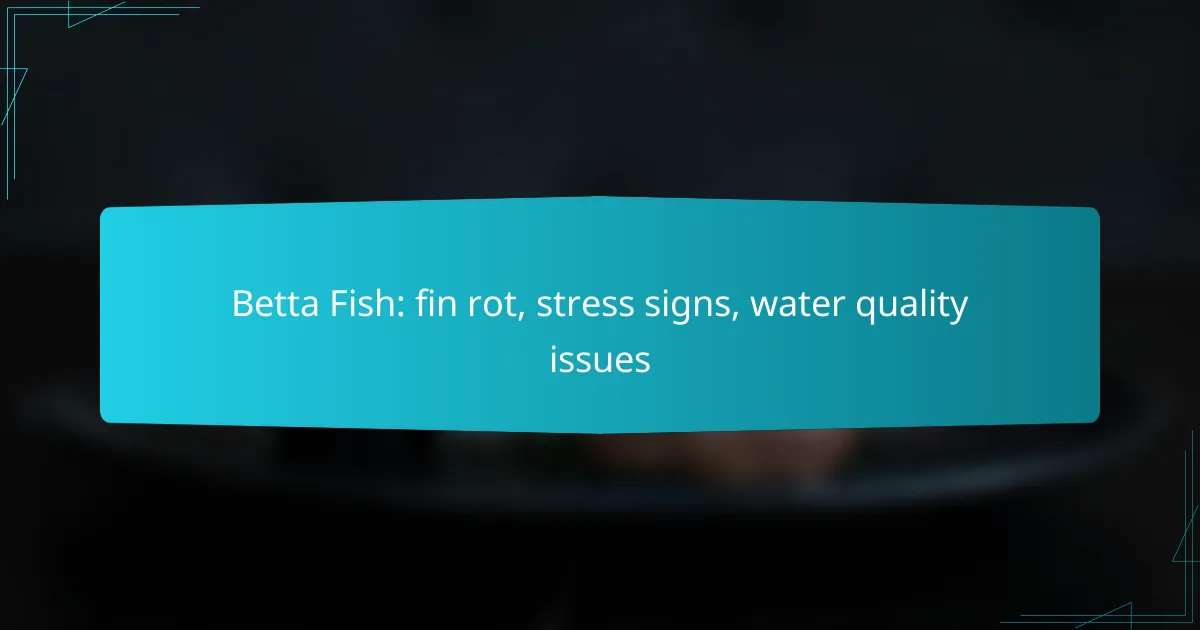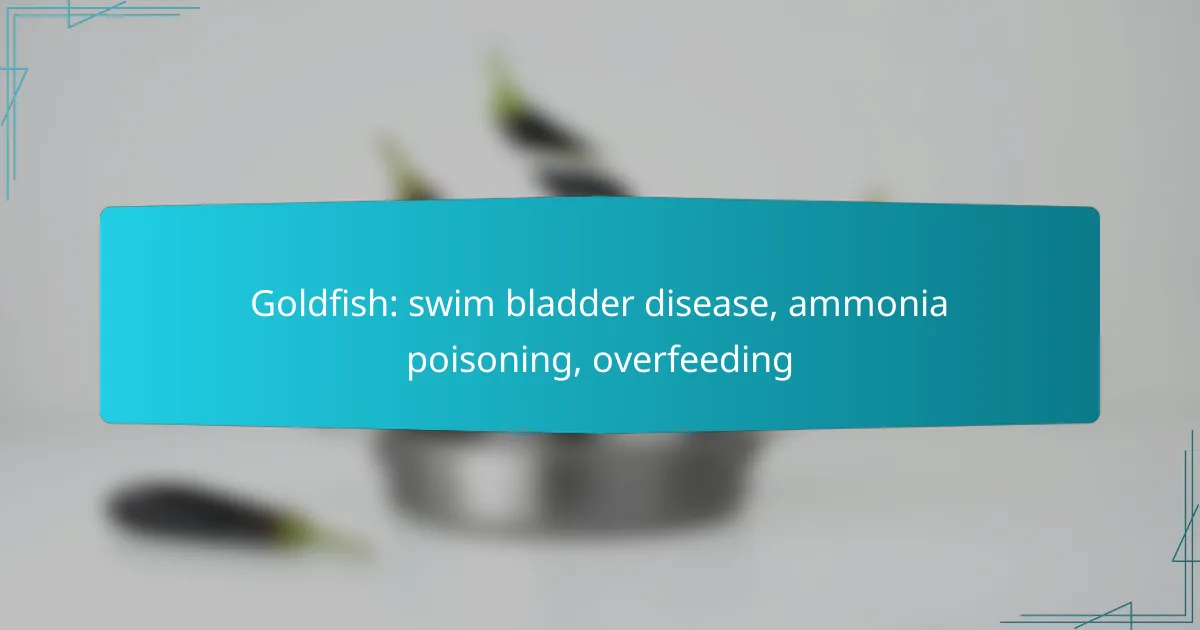Betta fish are vibrant and captivating pets, but they can suffer from various health issues, including fin rot, stress, and water quality problems. Understanding how to treat fin rot, recognize signs of stress, and maintain optimal water conditions is crucial for their well-being. By taking proactive measures, you can ensure a healthy and thriving environment for your Betta fish.

How to treat fin rot in Betta fish?
Treating fin rot in Betta fish involves a combination of methods to promote healing and prevent further damage. Key steps include using aquarium salt, applying antibacterial medication, and maintaining optimal water conditions.
Use aquarium salt for treatment
Aquarium salt can help treat fin rot by reducing stress and promoting healing in Betta fish. Dissolve the salt in water at a concentration of about 1 tablespoon per 5 gallons (approximately 19 liters) of water.
Ensure that the salt is fully dissolved before adding it to the tank. Monitor your Betta closely, as some fish may be sensitive to salt; if any adverse reactions occur, discontinue use immediately.
Apply antibacterial medication
Using antibacterial medication specifically designed for fish can effectively combat bacterial infections associated with fin rot. Look for products containing ingredients like erythromycin or tetracycline.
Follow the manufacturer’s instructions for dosage and duration of treatment. It’s crucial to complete the full course of medication to ensure all bacteria are eliminated and to prevent recurrence.
Maintain optimal water conditions
Maintaining optimal water conditions is essential for preventing fin rot and promoting recovery. Regularly test the water parameters, aiming for a pH between 6.5 and 7.5, and keep ammonia and nitrite levels at zero.
Perform partial water changes of about 25% weekly to keep the water clean and reduce stress on your Betta. Additionally, ensure the tank is adequately filtered and heated to the appropriate temperature, typically between 76°F and 82°F (24°C to 28°C).

What are the signs of stress in Betta fish?
Signs of stress in Betta fish include physical changes and behavioral shifts that indicate discomfort or poor health. Recognizing these signs early can help you take action to improve their environment and overall well-being.
Faded colors and clamped fins
Faded colors in Betta fish often signal stress or illness. When a Betta is healthy, its colors are vibrant and pronounced; dullness can indicate that the fish is not feeling well.
Clamped fins, where the fins are held close to the body instead of spread out, are another clear sign of stress. This behavior can result from poor water quality, aggressive tank mates, or inadequate space.
Excessive hiding behavior
Betta fish that frequently hide may be experiencing stress. While it’s normal for them to seek shelter occasionally, excessive hiding can indicate that they feel threatened or uncomfortable in their environment.
To address this, ensure that your Betta has plenty of hiding spots and that the tank is not overcrowded. Monitor interactions with other fish to reduce stressors.
Rapid gill movement
Rapid gill movement is a sign that your Betta may be struggling to breathe, often due to poor water quality or low oxygen levels. If you notice this behavior, it’s crucial to check the water parameters immediately.
Maintaining clean water with appropriate filtration and regular water changes can help prevent this issue. Aim for a stable temperature and pH to keep your Betta healthy and stress-free.

How to improve water quality for Betta fish?
Improving water quality for Betta fish is essential for their health and well-being. Key steps include regular water changes, using a quality water conditioner, and monitoring pH and ammonia levels.
Regular water changes
Regular water changes are crucial for maintaining a healthy environment for Betta fish. Aim to change 20-30% of the water weekly to remove toxins and replenish essential minerals. This practice helps prevent the buildup of harmful substances that can lead to stress and disease.
When performing water changes, use a siphon to clean the substrate and remove debris. Always ensure that the new water is treated and at a similar temperature to avoid shocking your fish.
Use a quality water conditioner
A quality water conditioner is vital for removing harmful chemicals such as chlorine and chloramine from tap water. Look for conditioners that also neutralize heavy metals and promote a healthy slime coat for your Betta. This can significantly reduce stress and improve overall health.
Follow the manufacturer’s instructions for dosage based on your tank size. Overusing conditioners can lead to imbalances, so it’s essential to measure accurately.
Monitor pH and ammonia levels
Monitoring pH and ammonia levels is critical for Betta fish care. The ideal pH range for Betta fish is typically between 6.5 and 7.5. Regular testing will help you maintain this balance and prevent fluctuations that can cause stress.
Ammonia levels should be kept at 0 ppm, as even low levels can be toxic. Use test kits to regularly check these parameters and take corrective actions, such as adjusting water conditions or performing additional water changes if necessary.

What are the common causes of fin rot?
Fin rot is primarily caused by poor water quality, physical injuries, and inadequate nutrition. Understanding these factors is essential for maintaining the health of your Betta fish and preventing this condition.
Poor water quality
Poor water quality is one of the leading causes of fin rot in Betta fish. High levels of ammonia, nitrites, or nitrates can stress fish and weaken their immune systems, making them more susceptible to infections.
To ensure optimal water quality, regularly test your aquarium water and perform partial water changes, typically around 25% weekly. Maintain a stable temperature between 24-28°C and keep the pH level between 6.5 and 7.5.
Injury or physical damage
Injuries or physical damage to a Betta’s fins can lead to fin rot. This can occur from aggressive tank mates, sharp decorations, or even during breeding activities.
To minimize the risk of injury, provide a spacious tank with smooth decorations and avoid housing Bettas with overly aggressive species. Monitor your fish closely for signs of stress or injury and separate them if necessary.
Inadequate nutrition
Inadequate nutrition can weaken a Betta’s immune system, making them more vulnerable to fin rot. A diet lacking in essential nutrients can lead to poor fin health and overall weakness.
Feed your Betta a balanced diet that includes high-quality pellets, frozen or live foods, and occasional plant matter. Aim for a varied diet to ensure they receive all necessary vitamins and minerals, and avoid overfeeding to prevent water quality issues.

How to prevent stress in Betta fish?
Preventing stress in Betta fish involves creating a suitable environment that meets their needs. Key factors include tank size, compatible tank mates, and effective filtration systems.
Provide adequate tank space
Betta fish thrive in spacious environments, ideally requiring at least 5 gallons of water. A larger tank allows for better swimming space and helps maintain stable water conditions.
Smaller tanks can lead to stress due to overcrowding and poor water quality. Ensure that the tank is not only spacious but also has decorations and plants to provide hiding spots, which can help reduce anxiety.
Avoid aggressive tank mates
Choosing the right tank mates is crucial for Betta fish’s well-being. Avoid species known for aggression, such as certain cichlids or fin-nipping fish.
Instead, consider peaceful companions like snails or certain types of tetras that won’t provoke your Betta. Always monitor interactions closely, especially when introducing new fish.
Ensure proper filtration
Effective filtration is essential for maintaining water quality and reducing stress in Betta fish. A filter helps remove waste and toxins, keeping the environment clean and safe.
Choose a filter with adjustable flow rates, as Betta fish prefer calm waters. Regular maintenance, including changing filter media and performing partial water changes, is vital to ensure optimal conditions.










